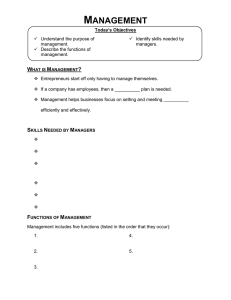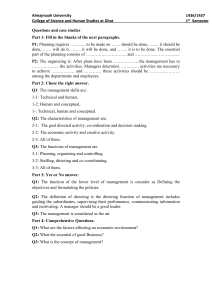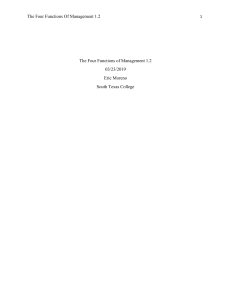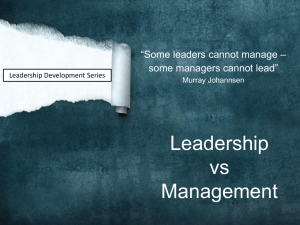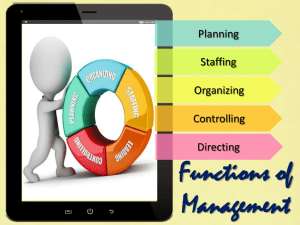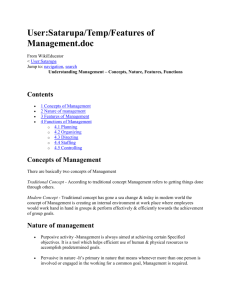Chapter1-Nature of management
advertisement
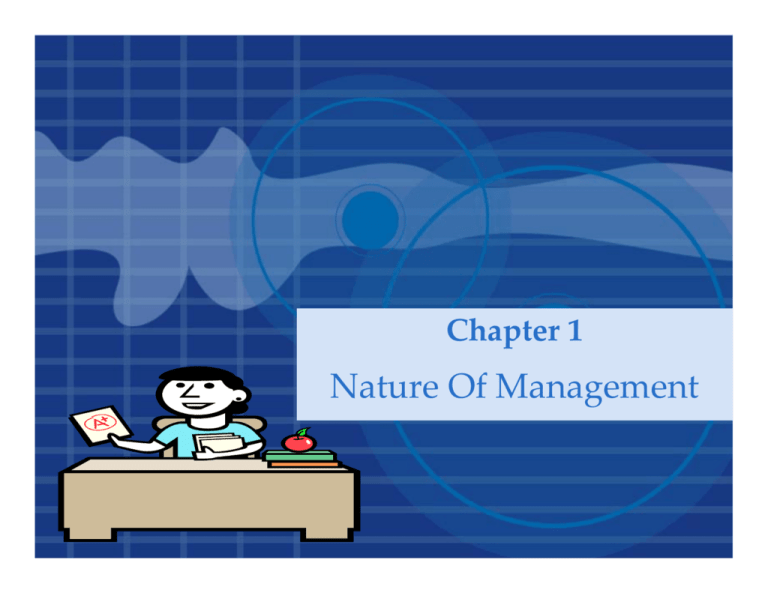
Chapter 1 Nature Of Management Objectives • Understand the Meaning and the definitions of Management • Features of , Functions and importance of management • Know and Understand the relation between Administration and Management Introduction • With the increasing complexities, managing the business concern becomes difficult. • Every business unit has objectives of its own. • The need of existence has increased tremendously. Meaning and Definition Of Management • Meaning of Management: – Management if the art of getting things done by a group of people with the effective utilization of available resources • Definitions of Management: – According to various experts like Peter F. Drucker, Ralph C. Davis etc. Definition of Management • Joseph L. Massie: Management is the process by which a cooperative group directs actions towards common goal • James D. Monny: Management is the art of directing and inspiring the people Definition of Management • G.E. Millward: Management is the process and the agency through which execution of policy is planed and supervised • Management is the process consisting the functions of: – Planning – Organizing – Staffing Characteristics of Management Three common characteristics of the organization Organizations are made up of people. Making a goal into reality entirely depends on people’s decisions and activities in the organization. purpose Every organization has its distinct purpose, which is typically expressed in terms of a goal or set of goals. Organization People All organizations develop a systematic structure that defines and limits the behavior of its members. Structure Characteristics of Management • Art as well as Science • Management is an activity • A continuous Process • Management achieving Pre-defined objectives Characteristics of Management • Organized Activities • Management is a Factor of Production Characteristics of Management • Management as system of activity • Management is a discipline Characteristics of Management • Management is a purposeful activity • Management is a distinct entity • Management aims at maximizing profit • Decision making • Management is a profession Characteristics of Management • Universal Application • Management is getting things done • Management as a class of a team • Management as a career Characteristics of Management • Direction and control • Dynamics • Management is needed at all levels • Leadership activity Functions of Management Planning Organizing Leading 1.Defining goals 2.Establishing strategy 3.Developing sub plans coordinate activities 1.Determining 1.Directing what needs to 2.Motivating done all involved 2.How it will parties be to done 3.Resolving 3.who is to do conflicts it Controlling Monitoring activities to Achieving the ensure that Resulting in organization’s they are stated purpose accomplished as planned Functions of Management • Planning: – Primary function of Management – specifying the goals to be achieved and deciding in advance the appropriate actions taken to achieve those goals – delivering strategic value - planning function for the new era • a dynamic process in which the organization uses the brains of its members and of stakeholders to identify opportunities to maintain and increase competitive advantage • process intended to create more value for the customer Functions of Management • Organizing: – Distribution of work in Group wise or section wise for effective performance. – Assembling and coordinating the human, financial, physical, informational, and other resources needed to achieve goals – The future requires building flexible organizations Functions of Management • Staffing: – Activities of selection and placement of competent personnel. – Filling and keeping filled with qualified people all positions in the business. – Managers must be good at mobilizing people to contribute their ideas Functions of Management • Directing: – The actual performance of a work starts with this. – Stimulating people to be high performers. – Influencing people's behavior through motivation, communication, group dynamics, leadership and discipline. Functions of Management • Co-coordinating : – All the activities are divided group wise or section wise under organizing function – Such activities are co-ordinated towards the accomplishment of objectives of the organization. – monitors progress and implements necessary changes – makes sure that goals are met – new technology makes it possible to achieve more effective controls Functions of Management • Motivating or actuating: – All the goals are achieved – Increasing the speed of performance Functions of Management • Controlling: – Ensures the confirmation of the achieved objectives to preplanned objectives Functions of Management • Innovation: – The presentation of personnel and organization to face the changes made in the business world • Representation: – Manager is the representative of the company • Decision-making: – Helps in the smooth functioning of an organization Functions of Management • Communication: – The transmission of human thoughts • Classification of functions of management according to Luther Gullik – POSDCORB Importance of Management • Management meet the challenges of change • Accomplishment of group goals • Effective utilization of business Importance of Management • Effective functioning of business • Resource development • Sound organization structure Importance of Management • Management directs the organization • Integrates the various interests • Stability Importance of Management • Innovation • Co-ordination and team-spirit • Tackling problems • A tool for personality development Administration & Management Board of Directors Administration General Managers Department Supervisor Workers Top Level Manager Management Difference between Administration & Management • Oliver Sheldon: Administration is concerned with the determination of the corporate policy. Management is concerned with the execution of policy within the limits set up by administration • William R. Spiregal: Administration is concerned with overall determination of industrial objectives. Management is concerned with carrying out of the broad policies laid down by administration Difference between Administration & Management • E.F.L. Brech: Management is a social process entailing responsibilities for the effective and economical planning. Administration is a part of management concerned with installation and carrying out of he procedures. • Theo Heimann: each manager performs both activities and spends part of his time administrating and part of the time managing. Difference between Administration & Management S. No. Basis of distinction Administration Management 1. Policy and objectives Determines policy to be followed and decide the objectives to be achieved Implements the policy and achieves the objectives 2. Directing of human efforts Not directly involves in the execution of plan and achievements of objectives Directly involves in the execution of plan and achieving objectives 3. Main function 4. Levels of executives Planning organizing and staffing Direction, motivation and control Top level executives Lower level executives 5. Position Acts as a Principal Acts as an agency 6. Knowledge Requires administrative ability more that technical ability Requires technical ability more that administrative ability Summary • A business develops in course of time with complexity • Management aims at maximizing profit • Many times the terms administration and management are used synonymously End of Chapter 1 Nature Of Management
